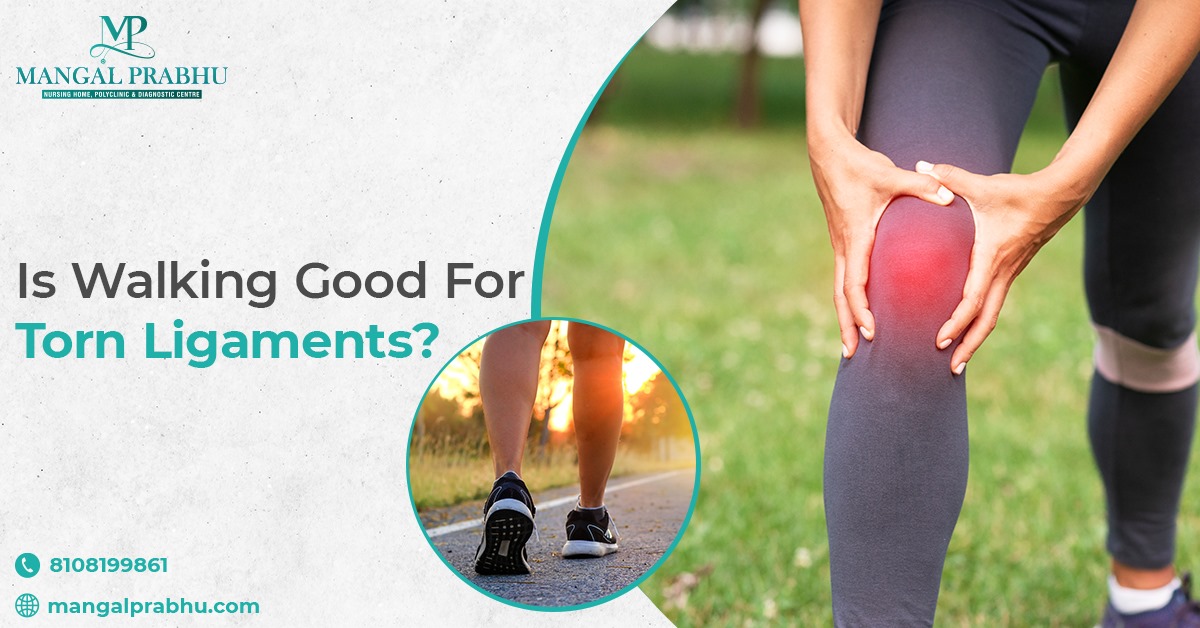
Is Walking Good For Torn Ligaments?
Torn ligaments can be a painful and debilitating injury, often raising questions about appropriate activities during the healing process. This article will explore the nature of torn ligaments, their symptoms, diagnosis, and whether walking is a suitable exercise during recovery. Here, you can also learn about the Mangal Prabhu Hospital. It is a trusted healthcare facility with an experienced Knee Replacement Surgeon in Navi Mumbai.
What are Torn Ligaments?
Ligaments are strong, fibrous bands of tissue that connect bones. They also provide stability to joints. When subjected to excessive force or trauma, these ligaments can tear. Hence, it results in a condition known as a torn ligament. This injury most commonly occurs in joints like the knees and ankles.
What are the Symptoms of Torn Ligaments?
Torn ligaments typically present with a set of distinct symptoms, including:
- Pain and Tenderness
- Swelling and Bruising
- Limited Range of Motion
- Joint Instability
- Popping or Snapping Sensation
How to Diagnose Torn Ligaments?
Accurate diagnosis of torn ligaments is crucial for determining the appropriate course of treatment. A healthcare professional will typically use a combination of methods, including:
i) Physical Examination:
The healthcare provider will examine the injured area, looking for signs of swelling, tenderness, and joint stability.
ii) Imaging Tests:
X-rays or MRI scans may be ordered to assess the extent of the ligament injury and rule out any accompanying bone damage.
iii) Medical History:
A detailed discussion of the injury, including how it occurred and the progression of symptoms, is essential for diagnosis.
Also Read: Is Orthopedic Surgery Worth It?
Is Walking Good For Torn Ligaments?
Walking can be a beneficial activity during the recovery from torn ligaments. But you should approach it with caution and under the guidance of a healthcare professional. In many cases, initial treatment may involve rest and immobilization. However, controlled and gentle walking exercises may be introduced as part of a rehabilitation program as healing progresses.
Walking can help maintain joint mobility, prevent muscle atrophy, and improve blood circulation, all supporting healing. Following a structured rehabilitation program prescribed by a medical professional is crucial. Attempting to resume normal walking too soon or overexerting oneself can delay healing or lead to further injury.
Other Exercises That Can Help Reduce Pain and Heal Torn Ligaments
In addition to walking, various exercises can aid in reducing pain and promoting the healing of torn ligaments. These exercises may include:
- Range of Motion Exercises.
- Strengthening Exercises.
- Balance and Stability Exercises.
- Low-impact activities such as swimming or stationary cycling can improve cardiovascular fitness without placing excessive stress on the injured ligament.
Conclusion
Walking can be beneficial during the recovery from torn ligaments, provided it is done cautiously and under professional guidance. Initial treatment often involves rest, but a structured rehabilitation program may incorporate walking and other exercises as healing progresses.
If you have suffered a ligament injury or require expert guidance on your recovery, consult knee replacement surgeons at Mangal Prabhu Hospital, a leading Knee Replacement Hospital in Navi Mumbai. Remember that patience, adherence to the prescribed treatment plan, and avoiding activities that could hinder healing are key to a successful recovery.
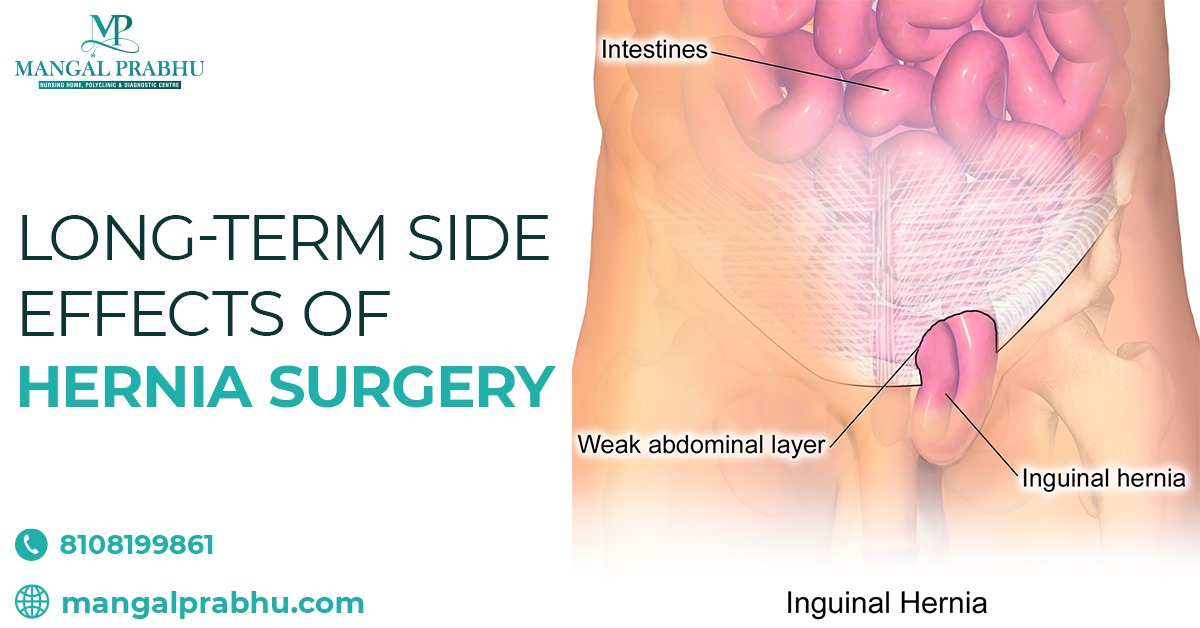
Long-term Side Effects Of Hernia Surgery
Hernia surgery is a common procedure that millions of people undergo each year to repair weakened or torn abdominal muscles. While the surgery is generally safe and effective, it’s essential to be aware of potential long-term side effects that can occur after the procedure. In this article, you can explore the long-term side effects of hernia surgery and strategies for managing them.
Overview of Hernia Surgery
Hernias occur when internal organs or tissues push through weakened or torn muscles, creating a noticeable bulge or lump. Surgery is often recommended to repair the hernia and prevent complications. At Mangal Prabhu Hospital, where you can find the experienced Hernia Surgeon in Navi Mumbai, patients receive comprehensive care and advanced surgical techniques to ensure successful hernia repair.
Short-term Side Effects of Hernia Surgery
Before delving into long-term side effects, it’s important to briefly mention the short-term side effects that patients may experience immediately after hernia surgery. These can include:
- It is normal to experience pain, swelling, and bruising around the surgical site. This discomfort usually subsides in the days and weeks following the surgery.
- Anesthesia and pain medications can cause temporary nausea and vomiting after surgery.
- Patients may need to restrict physical activity and avoid heavy lifting for a certain period to allow the surgical site to heal properly.
Long-term Side Effects of Hernia Surgery
While hernia surgery is generally successful in repairing the hernia, there are some potential long-term side effects that patients should be aware of:
- Some individuals may experience chronic pain or discomfort at the surgical site, known as chronic post-herniorrhaphy pain. This condition can persist for months or even years after the surgery.
- Although hernia surgery is intended to provide a permanent solution, there is a small risk of hernia recurrence. It can happen if the repaired tissues weaken or tear again over time.
- It’s common to experience numbness or altered sensation around the surgical scar. It usually improves over time but may not completely resolve in some cases.
- In rare instances, hernia surgery can lead to scar tissue formation that causes bowel obstruction. Symptoms may include abdominal pain, bloating, and constipation.
Strategies for Managing Post-Surgery Side Effects
If you experience long-term side effects following hernia surgery, here are some strategies to manage them effectively:
- Consult your healthcare provider for pain management options, including physical therapy, medications, or nerve blocks.
- Follow your surgeon’s post-operative instructions diligently, including avoiding heavy lifting and maintaining a healthy lifestyle to reduce the risk of hernia recurrence.
- Gentle massage and moisturizing of the surgical scar can help improve its appearance and reduce sensation changes.
- Schedule regular follow-up appointments with your hernia surgeon to monitor your recovery and address any concerns promptly.
Conclusion
Hernia surgery is a valuable procedure that can relieve and prevent hernia complications. While potential long-term side effects, such as chronic pain or recurrence, are relatively rare. Most patients experience successful outcomes. If you require Hernia Treatment in Navi Mumbai, Mangal Prabhu Hospital is home to experienced hernia surgeons who can provide comprehensive care and guidance throughout your surgical journey. Open communication with your healthcare provider is key to managing any post-surgery side effects and ensuring a successful recovery.
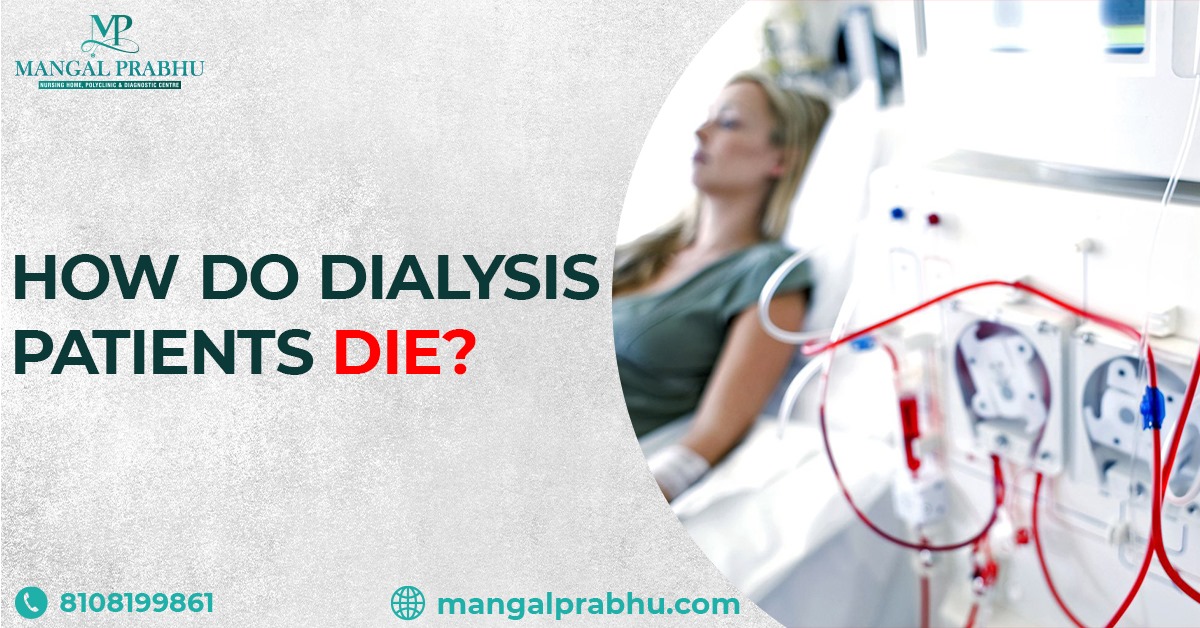
How Do Dialysis Patients Die?
Dialysis is a life-saving medical treatment for individuals with kidney failure. While it provides essential support by removing waste and excess bodily fluids, dialysis patients often face unique challenges and health risks. Here, you can explore how dialysis patients may face specific risks. Hence, understanding these risks helps you and healthcare professionals better manage and improve the care of dialysis patients.
What is Dialysis, and What Does it Do?
Dialysis is a medical procedure used to perform the critical functions of the kidneys when they can no longer do so effectively. It involves the removal of waste products and excess fluids from the blood. It helps maintain electrolyte balance and control blood pressure, ultimately prolonging kidney failure patients’ lives.
What are the Risks for Dialysis Patients?
Dialysis patients are exposed to several risks due to the chronic nature of their condition and the ongoing need for medical intervention. Some common risks include:
- Patients receiving Dialysis through a catheter or at a dialysis center are at risk of infection.
- Dialysis patients are more susceptible to heart problems.
- Chronic kidney disease often results in anemia.
- Kidney failure can disrupt the body’s balance of calcium and phosphorus.
Also Read: Preparing For Dialysis: What To Expect?
What Causes Dialysis Patients to Die?
Several factors contribute to the mortality of dialysis patients:
Cardiovascular Disease: Cardiovascular issues are a leading cause of death in dialysis patients. The strain on the heart and blood vessels due to fluid and electrolyte imbalances can result in heart attacks, strokes, and heart failure.
- Dialysis patients have weakened immune systems and are at higher risk of infections, which can become severe and life-threatening.
- Infections, if left untreated, can progress to sepsis, a severe response of the body to infection that can lead to organ failure and death.
- Complications related to dialysis access, such as infections or clotting, can lead to serious health issues.
- Dialysis patients may struggle with malnutrition due to dietary restrictions and loss of appetite, making them more susceptible to infections and other health problems.
How Can Dialysis Patients Reduce Their Risks?
At Mangal Prabhu Hospital, you can find a team of experienced Nephrologist in Navi Mumbai who provide specialized care for kidney-related conditions. Moreover, dialysis patients can take several steps to reduce their risks and improve their overall quality of life:
- Consistency in attending dialysis sessions and following prescribed treatment plans is crucial.
- Taking medications as prescribed to control blood pressure, anemia, and other complications is vital.
- Working with a registered dietitian to develop a kidney-friendly diet can help manage complications and maintain overall health.
- Proper hygiene, catheter care, and regular vaccinations can help prevent infections.
- Frequent visits to a nephrologist or healthcare provider are essential for monitoring overall health and addressing emerging issues promptly.
Conclusion
While Dialysis is a life-sustaining treatment for individuals with kidney failure, it has risks. Understanding these risks and their causes is essential for patients and healthcare professionals. At Mangal Prabhu Hospital, a trusted Dialysis Center in Navi Mumbai, experienced nephrologists work closely with patients to provide comprehensive care to improve the quality of life for dialysis patients. By adhering to treatment plans and maintaining a healthy lifestyle, dialysis patients can reduce their risks and maximize their chances of leading fulfilling lives despite their medical condition.
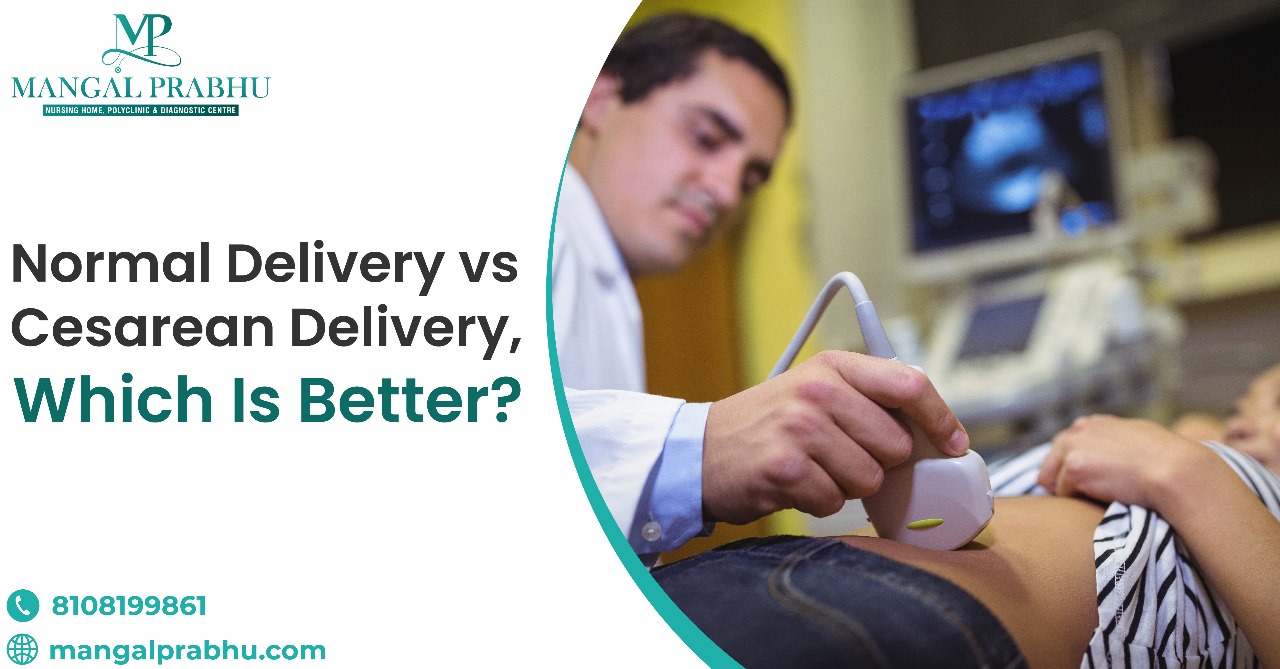
Normal Delivery Vs Cesarean Delivery, Which Is Better?
Childbirth is a life-altering experience for women. Regarding childbirth, doctors perform two primary methods: normal and cesarean. Both have advantages and disadvantages, and their choice often depends on various factors. In this article, with the guidance of a trusted Obstetrician in Navi Mumbai at Mangal Prabhu Hospital, you can learn the difference between these delivery procedures. You can also define and explore normal and cesarean deliveries’ benefits and health risks.
Definition of Normal Delivery vs. Cesarean Delivery
Normal Delivery
Normal delivery is also known as vaginal birth. It is the most natural way of bringing a baby into the world. It involves the baby passing through the birth canal, typically headfirst. Normal delivery can occur without medical interventions, but pain relief methods or assistance may sometimes be used.
Cesarean Delivery
It is often called a C-section. It is a surgical procedure where the baby is delivered through an incision in the mother’s abdomen and uterus. Doctors typically use it when complications or risks are associated with a vaginal birth.
Benefits of Normal Delivery:
- Mothers who deliver vaginally recover quicker than those who undergo C-sections. They can often resume their regular activities sooner.
- Since no abdominal surgery is involved, the infection risk is lower with normal delivery.
- Vaginal births often facilitate immediate skin-to-skin contact and bonding with the baby, making breastfeeding initiation easier.
Benefits of Cesarean Delivery:
- Cesarean deliveries are typically scheduled or planned, providing a controlled environment for the birth, which can be beneficial in certain medical situations.
- C-sections can reduce the risk of birth injuries, especially when the baby is in an abnormal position or size.
- Some women may prefer C-sections to avoid the potential pain and trauma associated with vaginal delivery.
Also Read: What Are The Side Effects Of A C-section Delivery?
Health Risks Associated with Normal Delivery:
- Vaginal births can result in perineal tears, which may require stitches and lead to discomfort during recovery.
- There is a risk of pelvic organ prolapse, where the pelvic organs shift from their normal position, causing discomfort and requiring further medical attention.
- Some women may experience urinary or fecal incontinence due to the strain placed on the pelvic floor during vaginal birth.
Health Risks Associated with Cesarean Delivery:
- C-sections involve surgery, which comes with inherent risks such as infection, bleeding, and anesthesia-related complications.
- Mothers who undergo C-sections have a more extended recovery period and may experience pain and discomfort at the incision site.
- Immediate skin-to-skin contact and bonding with the baby can be delayed in C-sections due to the surgical procedure.
Conclusion
Both normal and cesarean delivery have advantages and disadvantages. Their choice should be based on individual circumstances, including medical conditions, risks, and the mother’s and healthcare provider’s preferences. Expectant mothers must have open and thorough discussions with their obstetricians, such as those at Mangal Prabhu Hospital, a trusted maternity/pregnancy hospital in Navi Mumbai, to make the most informed decision.
Ultimately, there is no one-size-fits-all answer to whether normal or cesarean delivery is better. The well-being of both the mother and the baby should be the primary consideration, and the chosen delivery method should align with their unique needs and circumstances.

What Is The Most Common Cause Of Premature Birth?
What is premature birth?
The term “premature birth” carries significant weight, as it represents a complex and often challenging aspect of pregnancy. It medically known as preterm birth, occurs when a baby is born before completing 37 weeks of gestation. Typically, a full-term pregnancy lasts about 40 weeks. Premature birth can lead to various health complications for the newborn, as their organs and systems may not fully develop.
Causes of premature birth
The causes of premature birth are multifaceted and often challenging to pinpoint precisely. However, several common factors increase the risk of preterm delivery. Here, you can explore some of the most common causes of premature birth and treatment and prevention strategies.
Common Causes of Premature Birth
Hypertension
One of the leading causes of premature birth is hypertension or high blood pressure during pregnancy. Chronic hypertension or the development of gestational hypertension can increase the risk of preterm labor. High blood pressure can strain the placenta, reducing blood flow to the baby and increasing the likelihood of early delivery.
Mangal Prabhu Hospital’s team of skilled healthcare professionals, including neonatologists in Navi Mumbai, plays a crucial role in managing and addressing hypertension-related complications during pregnancy. Timely diagnosis and intervention are essential to mitigate the risks associated with high blood pressure.
Placental Problems
Problems with the placenta, such as placental abruption and placenta previa, can also contribute to premature birth. Placental abruption occurs when the placenta separates from the uterine wall prematurely, depriving the baby of oxygen and nutrients. Placenta previa, on the other hand, is when the placenta covers the cervix, blocking the baby’s exit.
For expectant mothers experiencing placental issues, seeking care from a specialized NICU hospital in Navi Mumbai is crucial. The hospital’s experienced medical team can provide the necessary interventions and closely monitor the mother and baby’s health.
Infections
Infections during pregnancy, especially those affecting the reproductive or urinary tract, can increase the risk of premature birth. Infections can trigger an inflammatory response in the body, potentially leading to preterm labor.
Also Read: Understanding Neonatal Intensive Care: What Parents Need To Know
Treatment and Prevention of Premature Birth
Medical intervention
Medical professionals, including neonatologists in Navi Mumbai, are equipped to manage and treat conditions that can lead to premature birth. In cases of hypertension, healthcare providers may prescribe medication or recommend lifestyle modifications to control blood pressure. Placental problems may require close monitoring and, in severe cases, surgical intervention.
Lifestyle changes
Preventing premature birth also involves making healthy lifestyle choices during pregnancy. Expectant mothers can reduce their risk by:
- Attending regular prenatal check-ups to monitor for any potential issues.
- Maintaining a balanced diet rich in essential nutrients.
- Staying physically active within the limits recommended by healthcare providers.
- Managing stress and getting adequate rest.
- Avoiding tobacco and alcohol use.
Conclusion
Premature birth remains a significant concern for expectant mothers and healthcare providers alike. While the causes of premature birth can be complex, understanding the risk factors and seeking timely medical care is essential to preventing and managing preterm delivery.
Mangal Prabhu Hospital is committed to providing comprehensive care for expectant mothers and their newborns with its dedicated team of healthcare professionals, including neonatologists, and a state-of-the-art NICU hospital in Navi Mumbai. By addressing the common causes of premature birth and offering specialized treatment and support, this hospital plays a vital role in ensuring the well-being of both mothers and their premature babies.
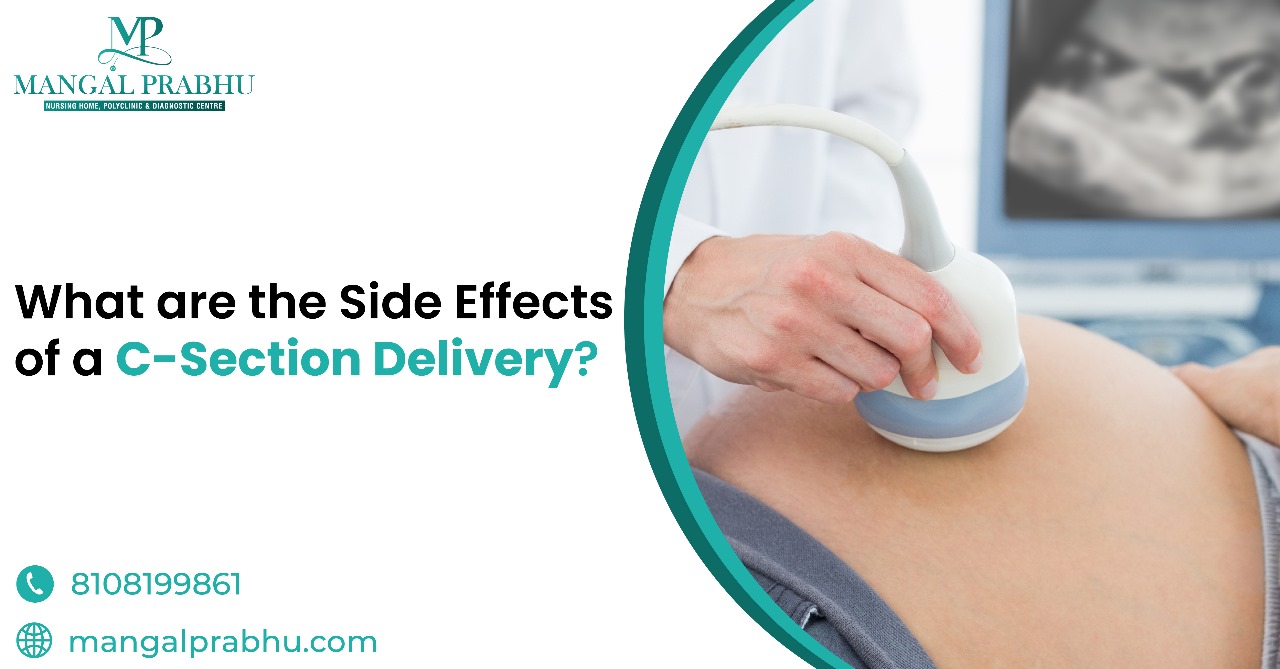
What Are The Side Effects Of A C-section Delivery?
C-section or Cesarean delivery is the birth of a baby through a surgical incision on the mother’s abdomen instead of delivering it through the vagina. You must need to visit a professional surgeon at a cesarean delivery hospital in Navi Mumbai to determine whether or not you are an ideal candidate for a vaginal delivery.
You might need a c-section if your baby’s heartbeat seems to be getting abnormal, your labor isn’t progressing, you have twins, a blockage in the birth canal, a prolapsed umbilical cord, etc. Women who had their first child delivered through C-section might be advised to have their future deliveries through an abdominal incision.
Short-Term Side Effects
Like any surgery, a C-section comes with its share of risks, including pain and discomfort for a few days following the surgery. It also leads to the risk of infection around the incision site. Infections occur when the bacteria spread inside the uterus.
If you notice unusual swelling, redness, and bleeding at the site of incision and excessive pain that won’t go away on its own, visit the pregnancy care hospital in Navi Mumbai to rule out the possibility of infection. High fever, fatigue, and a foul-smelling discharge are also common signs of bacterial infection.
Also Read: Understanding Vaginal Birth After Cesarean (VBAC)
Long-Term Side Effects
There can be long-term side-effects of c-section, such as blood clot formation in your veins or a surgical injury that can damage your bladder or bowel. Let’s check out a few common adverse effects of the C-section.
1. Reaction to Anesthesia:
Depending on the type of anesthesia given, you might experience a sore throat, nausea, vomiting, fever, and other complications.
2. Injury from the Surgery:
It’s a rare complication of a C-section delivery but is possible. A surgical injury can occur to the bladder, bowel, and other surrounding organs. It can also cause injury to the baby.
3. Complicated Future Pregnancies:
C-section increases the risk of complications in future pregnancies. Although it’s possible to deliver a child normally after one c-section, most doctors recommend c-sections for future deliveries. Frequent cesarean deliveries can also cause placenta accreta, placenta previa, and other such complications.
What Does Recovery from C-section Look Like?
Recovery might take anywhere between 4 and 6 weeks after the surgery, and longer depending on the complications in your pregnancy. You will be advised to avoid strenuous activities, heavy lifting, and physical exercises for the first few weeks.
You might experience slight cramping and bleeding from the incision site, but all these side effects are temporary and will eventually fade once you have recovered fully. You will be given painkillers for the first few days. You must refrain from having intercourse for a few weeks or until your surgeon gives you the green light.
Conclusion
If there are any complications in your pregnancy or there’s a risk to the baby or the mother’s health, the doctor might recommend an emergency c-section. This can produce the above-listed symptoms, although not everyone experiences complications. Ask your surgeon for more information about full recovery and post-partum care.

How Do A Woman Get An Urinary Tract Infection?
UTI is a common issue that can obstruct the overall body functioning of a woman. It can lead to numerous health conditions which can make the life of women challenging. However, it would be best to consult the experts from Mangal Prabhu Hospital, who have the best Urologist in Navi Mumbai. They offer the best treatment plan according to an individual’s needs and preferences.
Common Causes of UTI in Women
Women have to suffer from numerous health conditions in their lives more than men. One of the most common health conditions most women experience once in their life is Urinary Tract Infection. Urinary tract infections can be caused for various reasons, but one of the most common causes is bacteria entering the body through the urethra.
Bacteria enter the different parts of the urinary tract through the tube that carries urine from the bladder. The bacteria can also enter the body from the skin around the urethra or through the bloodstream. However, some of the most common causes of UTI in women are:
- Menopause
- Hormonal imbalance
- Anatomical factors
- Immunocompromised status
- Improper sexual activity
- Urinary tract obstruction
- Diabetes
Symptoms of UTI in Women
Some other symptoms demonstrate that you have a UTI. So let’s see the most common symptoms of UTI in women.
- Burning sensation or pain during or after peeing
- Lower back pain
- Urgent need to pee
- Cloudy or bad-smelling urine
- Pus or blood in the urine
- Craps, soreness, or pressure in the lower abdomen, back, or sides
- Chills
- Fever
- Fatigue
- Nausea and vomiting
Also Read: How To Recognize, Treat, And Prevent Urinary Tract Infections (UTI’s)?
Diagnosis and Treatment of UTI in Women
Mangal Prabhu Hospital is well-known as the best Urology Hospital in Navi Mumbai. They offer comprehensive treatment plans and diagnoses to treat urinary tract infections. Doctors usually diagnose UTIs according to the severity and symptoms of the condition. However, the best urologist recommends a urine test and performs a physical exam to check the presence of bacteria in the urinary tract area.
UTI can be treated very quickly with the antibiotics prescribed by doctors. However, the dosage and the type of medication also depend on the type of bacteria. Besides medication, a patient has to follow some prevention tips to get through the UTI.
Prevention of UTI in Women
UTI is a critical condition that can get back if one does not care for their health. However, there are various things that every woman should consider to prevent UTIs and other infections.
- Drink a lot of water
- Get proper diet
- Get regular workout
- Avoid holding pee
- Pee regularly
- Wipe the genital area from front to back
- Pee every time before and after sex
- Wear loose and breathable clothing
- Avoid using scented products
Conclusion: How to reduce the risk of UTI in Women
UTI is a critical bacterial infection that occurs in the urinary tract region, including the bladder, ureters, kidney, and urethra. It can easily be treated but also come back if one does not properly care for the genital area. However, the tips mentioned above are clinically proven to prevent the risk of developing UTI and help to keep the urinary tract area healthy and safe.
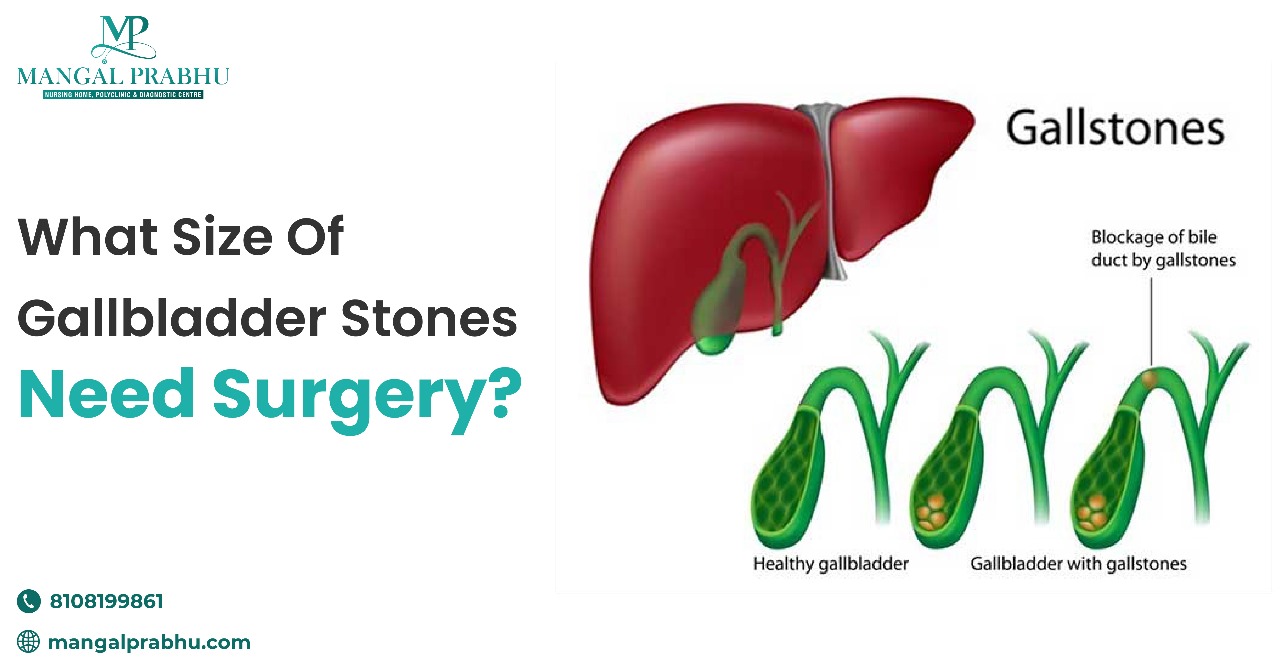
What Size Of Gallbladder Stones Need Surgery?
Gallstones Also called Cholelithiasis, gallbladder stones are the accumulation of digestive juices in a hard form in your gallbladder. These can vary in size, ranging from small grain-sized stones to tennis-ball-sized stones.
Irrespective of the size of these stones, they might require treatment as they pose a serious health threat if the stone travels to the bile duct. You can reach out to the gastroenterologist to discuss your treatment options. In the meantime, let’s learn more about gallbladder stones.
What Causes Gallbladder Stones?
A majority of gallbladder stones (around 75%) are made of cholesterol. So, those diagnosed with a higher level of cholesterol, whether because of obesity or diabetes, might develop gallbladder stones. Your liver filters cholesterol from the blood and sends it to the bile as a waste product.
Your bile duct secretes chemicals that dissolve the waste, including cholesterol. However, if the level of cholesterol in your blood increases beyond the normal level, the chemicals might be unable to dissolve them. This creates crystals, which eventually become stones. Other causes of gallbladder stones are excess bilirubin and gallbladder stasis.
What Are The Symptoms Of Gallbladder Stones?
Gallstones do not cause any problems unless they get lodged somewhere and lead to a blockage. If that happens, you might notice these symptoms:
- Extreme pain in the upper right abdomen
- The pain can radiate to different parts of your abdomen and can sometimes be felt on the shoulder blades.
- Nausea and vomiting
The pain might last for a few minutes to several hours and your upper abdomen can feel sensitive to touch.
Also Read: A Comprehensive Guide To Gallbladder Stone Removal
What Size of Gallbladder Stones Need Surgery?
As mentioned above, the symptoms you experience matter more than the size of the gallbladder stones. They can be as small as 1 centimeter but might require surgical removal of the entire gallbladder because of the painful symptoms.
Or, they could be big but cause no symptoms. Usually, gallbladder stone surgery is required when the hardened crystals have caused the blockage or the stones have led to other complications, like acute pancreatitis, or bile duct cancer.
Surgical removal of gallbladder stones is your best option to avoid any complications. For other non-invasive gallbladder stone treatments in Navi Mumbai, talk to a healthcare provider and get a diagnosis. They will check the size of these stones and the symptoms to recommend the most suitable treatment.
Laparoscopic surgery is the best for gallbladder stones. It has a faster recovery period and fewer complications than the open surgery counterpart.
What Are the Risks and Complications of Gallbladder Surgery?
You might have gas pain after a laparoscopic gallbladder stone surgery, as the gas is used to get a better view of your internal organs. There’s less risk of complications in laparoscopic surgery. In rare cases, infection, bleeding, or damage to the surrounding organs can cause complications.
Conclusion
Surgical removal of gallbladder stones is the best treatment option. The hardened crystals might not cause any symptoms initially, but there’s always a risk of infection and other complications present. So, it’s best to get them surgically removed.
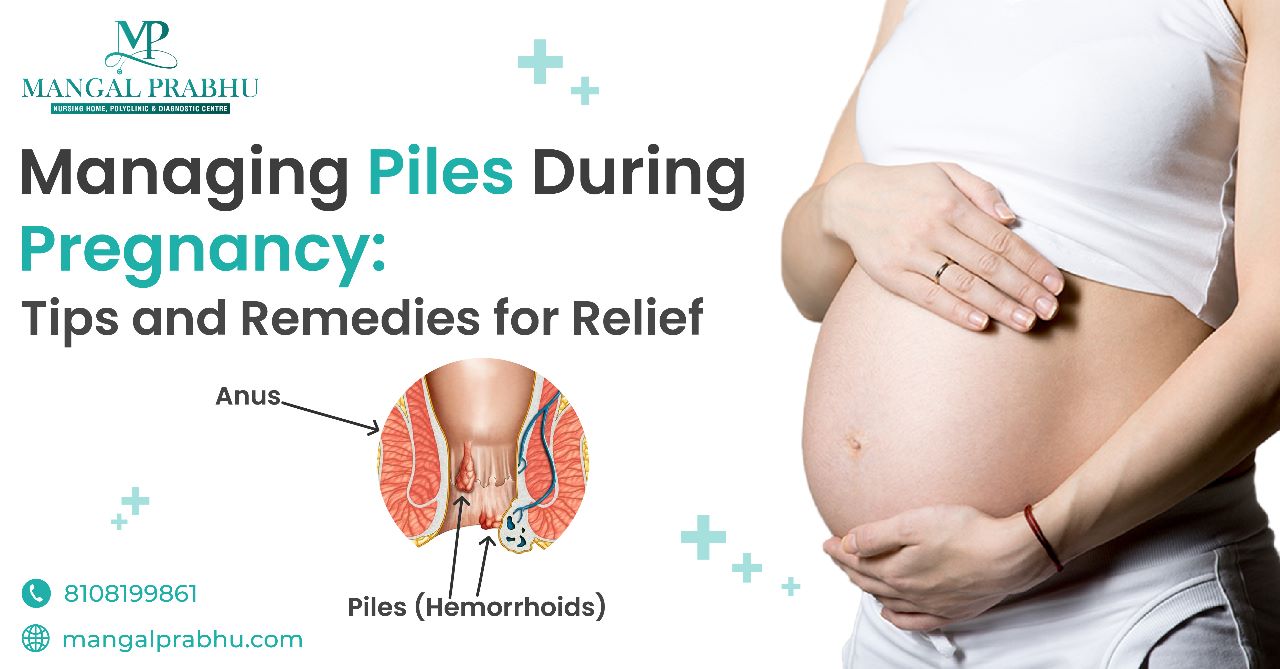
Managing Piles During Pregnancy: Tips and Remedies for Relief
Pregnancy is the most critical phase of every woman’s life, but it can also become complicated when an individual suffers from other issues. More than 2 percent of pregnant women suffer from piles of hemorrhoids for various reasons. However, treating this issue is very important as it can cause severe complications if left untreated. So if you are also looking for the best piles treatment hospital in Navi Mumbai, you must visit Mangal Prabhu Hospital to get the best treatment for piles or other issues during pregnancy.
Understanding Piles and Their Prevalence in Pregnancy
Piles or hemorrhoids are common health conditions that can cause severe complications in an adult if treated incorrectly. It is a common issue for pregnant women that causes various complications such as pain, bleeding, itching, and fullness in the rectum. Piles are usually swollen veins in the rectum and anus that happen for multiple reasons. Piles during pregnancy can be caused due to increased pressure on the pelvic area, constipation, hormonal imbalance, etc., leading to inflamed and enlarged veins in the bowel area.
Identifying the Symptoms of Piles During Pregnancy
Piles are a critical health condition that can obstruct the body’s overall functioning. This issue can worsen during pregnancy, and its symptoms can also differ from mild to severe piles. However, some of the common symptoms of piles during pregnancy are:
- Lumps around the anus
- Bleeding
- Pain
- Itching, swelling, or soreness around the anus
- The feeling of fullness in bowel movement
Also Read: What Is The Best Treatment For Piles?
Factors Contributing to Piles During Pregnancy:
Piles are an unpleasant issue caused when pressure bears down the lowest part of the digestive system or pelvic area. The pressure on the pelvic region is so heavy that the veins in the rectum and anus become inflamed and sometimes start bleeding after bowel movement. It can be caused due to various reasons, such as:
- Constipation
- Pressure of fetus
- Increase blood volume
- Lifting heavy objects
- Being obese or overweight
- Diarrhea
- Standing or sitting for an extended period
- Smoking
- Using too much steroid or other medication
- Drinking alcohol
Seeking Professional Help: When to Consult a Doctor
When you experience bleeding or other piles of piles during pregnancy, it would be best to consult the best Piles Treatment Doctor in Navi Mumbai to get an immediate and best treatment plan to overcome this issue. Experts doctors at Mangal Prabhu Hospital quickly diagnose the piles’ cause and offer a comprehensive treatment option to get through all the symptoms of piles and prevent other complications related to hemorrhoids.
Managing Piles Naturally: Home Remedies and Self-Care
Doctors offer the best treatment of piles during pregnancy, but they can also be treated with home remedies and self-care. However, some of the best home remedies to manage piles during pregnancy and relieve its symptoms are given below:
- Drinking plenty of water and other fluids
- Eat high-fiber diet
- Using sitz bath
- Exercise that improves circulation and reduces constipation
- Use over-the-counter medicines
- Applying cold compress
Conclusion
Pregnancy sometimes causes piles due to pressure on the lower part of the body or constipation. However, it can easily be managed with the help of proper home care tips to prevent future complications. However, it would be best to consult with the doctor to avoid future complications.
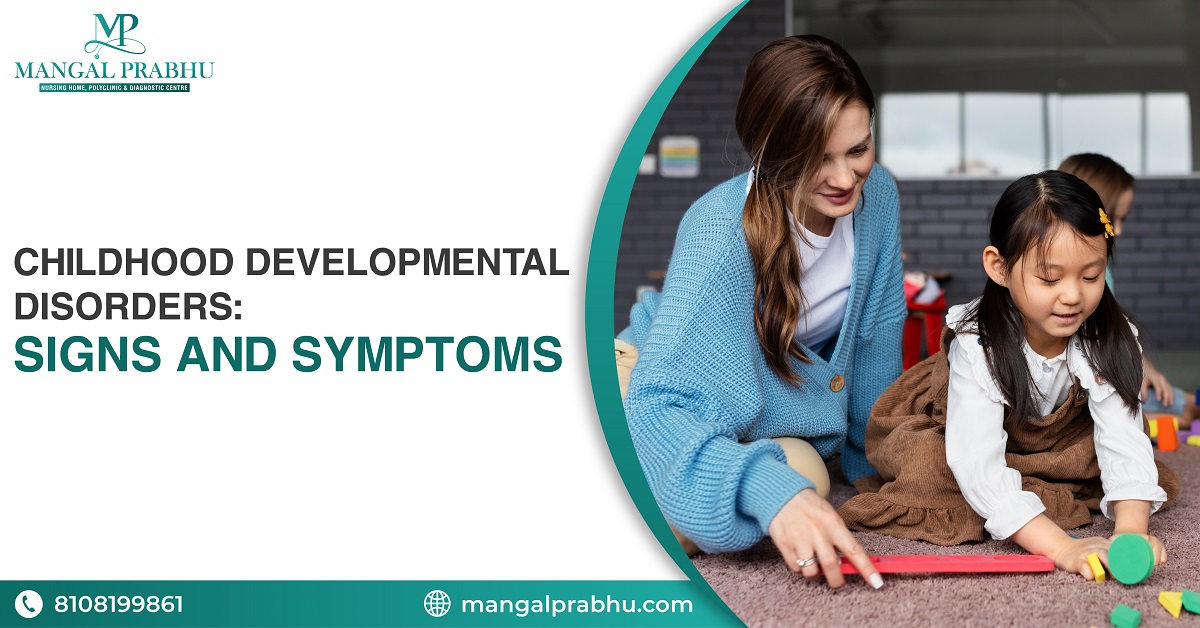
Childhood Developmental Disorders: Signs and Symptoms
Introduction: Defining Childhood Developmental Disorders
Every human being is born with different needs, and an individual has to understand the unique needs of others. The diverse requirements of a human being also apply to a child with developmental issues. Due to developmental disorders, some children need more time and better surroundings to grow well. Development disorders affect every child differently, and parents must understand their child’s requirements.
However, it would be best to consult the expert from Mangal Prabhu Hospital as they have the best Pediatrician in Navi Mumbai who allows the best treatment plan according to the child’s needs. A child with a developmental disorder may struggle with better social, cognitive, emotional, or physical functioning, which obstructs their ability to interact, learn or play with others.
Common Types of Childhood Developmental Disorders
Childhood development disability can begin at birth or during the early stage of childhood. Some of the most common types of childhood development disorders are:
1) SLD( Speech and Language Disorder):
SLD obstructs the area of the brain that restricts the ability of a child to communicate with others. It may also sometimes affect the understanding and speaking ability of a child.
2) ID (Intellectual Disorder):
It affects the intellectual brain activity of a child, which restricts the ability of decision-making, understand, and learn new things.
3) ADHD (Attention Deficit Hyperactivity Disorder):
In ADHD, a child cannot control impulsive behavior, pay attention to anything, or stay still.
4) ASD (Autism Spectrum Disability):
ASD is another complex condition that obstructs a person’s communication and interaction ability.
Also Read: 7 Reasons Your Baby May Need NICU Care
Signs and Symptoms of Childhood Developmental Disorders
A parent may experience the signs and symptoms of childhood development disorder very early as their child is more likely to be uncomfortable around people. However, symptoms may also differ depending on the different types of conditions.
- Sensory issue
- Difficulty in playing, learning, or iterating
- Delay development
- Behavioral issue
- Difficulty in walking or running
- Difficulty in communicating
Diagnosis and Treatment of Childhood Developmental Disorders
Mangal Prabhu Hospital is well-known as the best Children’s Hospital in Navi Mumbai and offers the best childcare diagnosis and treatment without any hassle. However, some of the most common diagnosis techniques for childhood development issues are:
- Speech and language assessment
- Intelligence testing
- Development assessment
- Physical therapy assessment
- Occupational therapy assessment
If a child is diagnosed with a childhood developmental disorder, then the doctor may offer a wide range of treatment plans according to the condition which are as follows:
- Physical therapy
- Special education service
- Behavioral therapy
- Early intervention service
- Occupational therapy
- Speech and language therapy
Conclusion: Supporting Children with Developmental Disorders
Childhood development disorder is a rare but critical issue that can be treated if one takes proper care of their child’s constitution. However, every parent has to educate themselves about the disorder, understand their child’s condition, consult with the doctor, offer therapies, and provide other support to their child to get through their issue.
